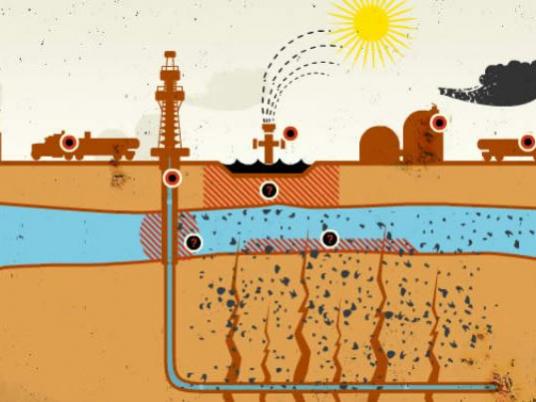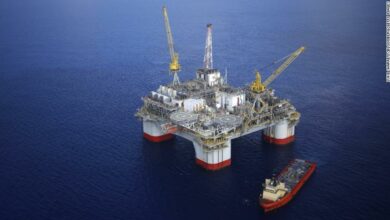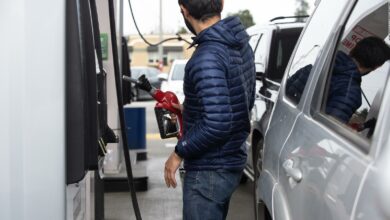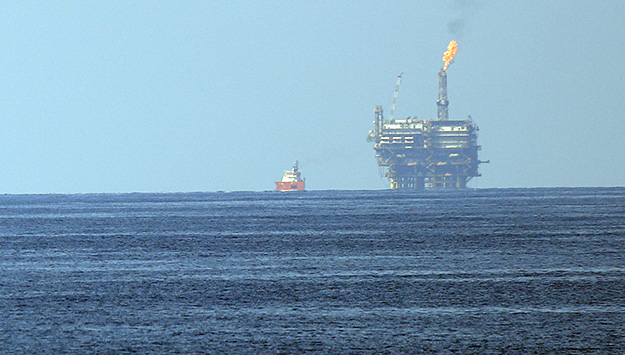
The village of Fares, located about 75km north of the city of Aswan near Kom Ombo, is currently being destroyed by severe flooding of contaminated water caused by controversial oil drilling practices performed over the past four years, according to residents.
Fares is an agricultural village home to approximately 25,000 residents.
While they rely on arable land to survive, the continuous destruction of farms, trees, water supplies and even housing has forced many to try move away from the village into the desert, or onto higher terrain in the mountains.
However, government officials have been preventing evacuees from relocating onto what they claim is “private land,” leaving many of Fares’ residents homeless.
According to Sheikh Ahmed Abdel Hameed, a resident of Fares and key community activist, the initial floodings started in 2009 when oil drillers from DanaGas started test drilling on residential land in Fares without local consent.
“Not long after the drillers left, contaminated water started to pump out of the ground from the holes they had made, destroying everything,” says Abdel Hameed, adding that now over 500 feddans of land and housing has been destroyed by constant flooding.
“It’s poisonous water, and even small amounts destroy the plantations and trees, instead of hydrating them … and sometimes it can get up to five feet high, destroying our houses too.”
It is believed that this reaction is caused by a controversial drilling practice known as hydraulic fracturing, or fracking. It entails drilling a vertical tunnel thousands of feet below the surface until it reaches a layer of rock where gas or oil are buried.
A horizontal tunnel is then drilled into the layer of rock, after which enormous quantities of water containing erosive chemicals are pumped through the tunnel in order to send shockwaves through the rock, hence releasing the trapped fossil fuels.
The practice is currently banned in several US states, as well as parts of Australia and Canada, due to the fact that the chemicals used in the process have, on some occasions, seeped into underground water supplies, causing immense environmental damage.
However, another reason why fracking is banned in many countries is also due to the fact that the chemically infused water used to fracture the deep rock is often not disposed of properly leading to environmental destruction.
Currently, there are three main hydraulic fracturing wells operated by DanaGas in areas surrounding the Fares village, and resident believe that water spontaneously coming out of the village holes from “test drills” is connected to those sites.
After several complaints, Abdel Hameed says that DanaGas has provided the village with some compensation over the years.
But residents complain that said compensations –– often in the form of LE100 to LE200 individual payoffs or donations to build facilities like a new library –– are insufficient in comparison to the damage that has been done.
In addition to fracking, residents say that “explosions” –– occurring for unknown reasons –– set off by DanaGas drillers in surrounding areas have contributed to the flooding.
Numerous follow up complaints were consequently filed to the governor of Aswan, DanaGas, and the ministry of petroleum, but residents says they have fallen on deaf ears.
DanaGas was unavailable to comment on the issue, however, like most oil and gas drilling companies in Egypt, DanaGas operates under a Production Sharing Agreement (PSA) with the Ministry of Petroleum.
A PSA is a joint venture between a country’s government and a resource extraction company. Egypt’s petroleum ministry currently has five entities operating under it; among them are EGPC, EGAS, and Ganope, which is the entity responsible for all petroleum activities in Aswan, such as those of DanaGas.
Ganope, among with the Egyptian Environmental Affairs Agency (EEAA), is responsible for ensuring that all drilling practices performed in Aswan abide by strict environmental preservation laws. But as with many environmental issues plaguing Egypt, responsibility is often passed on to an adjacent governmental body.
Mahmoud Shawki, the EEAA official responsible for overlooking oil and gas drilling environmental impact reports, stated that Fares was the sole responsibility of Ganope.
When Ganope was approached, they stated that because it was an environmental issue, it was the responsibility of the EEAA. However, when directly confronted with the claims of Fares’ residents as well as the response of the EEAA, Mohamed Askar, the Ganope official responsible for Aswan area, told Egypt Independent that the problems plaguing Fares cannot be related to hydraulic fracturing.
“[Underground] pressure in this part of the country is so low that hydraulic fracturing alone doesn’t work efficiently like it does abroad,” he says.
“In fact we have to inject special gases into the drills in order to force and suck the oil out like a straw, which is then taken away and treated,” says Askar.
However when asked if perhaps said chemicals used to “suck out the oil” could in fact cause underground water, now contaminated with chemicals, to later rise up and burst onto the surface, Askar responded by stating that it’s “impossible, there must be something else related to the Nile causing it that isn’t connected to oil drilling.”
But such claims, responses and passing on of governmental duties, whether true or not, only make matters worse for the residents of Fares whose lives continue to be destroyed by the day with no end in sight.
In order to address this, the Egyptian Initiative for Personal Rights (EIPR) has launched a campaign to help residents of Fares get to the bottom of the issue and lobby for their rights.
The EIPR first started focusing its attention on controversial oil drilling practices last September when Shell announced that it would be using hydraulic fracturing to release natural gas in the western desert.
The organization first demanded that an immediate moratorium be placed on the practice until Egypt had governmental institutions capable of properly overlooking the details of all drilling practices, and closing many of the potential loopholes in the bureaucratic process.
This demand is yet to be met. However now, due to the direness of the situation, the campaign has focused its attention primarily on the people of Fares.
“Whether or not it is directly related to the oil drilling or not, the people of Fares have a right to their land, to find out what or who is destroying it, and be able to hold those guilty accountable as well as receive proper compensation for their losses,” says Reem Labib, an environmental justice researcher with EIPR.
“There are clear signs that relate the problems of contaminated flooding in Fares to oil and gas drilling practices, so if they’re not related like they claim, then we need to confirm that and determine what is.”
According to Labib, the next step for the group is to collect samples of the flooded water from Fares and determine what chemicals and pollutants it contains.
However, given current political turmoil, it is uncertain when this will be carried out.
In the meantime, residents of Fares continue to fear for their future.
“Please help us,” says Abdel Hameed. “We have tried all in our power and knocked on every door possible. Nothing is working and no one cares because we are a small village and far away, but we are Egyptians too, and we have nowhere to safely live and no land to farm to survive.”




